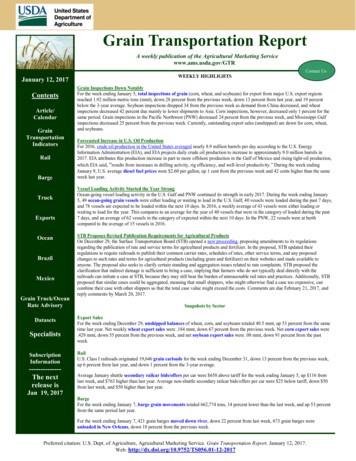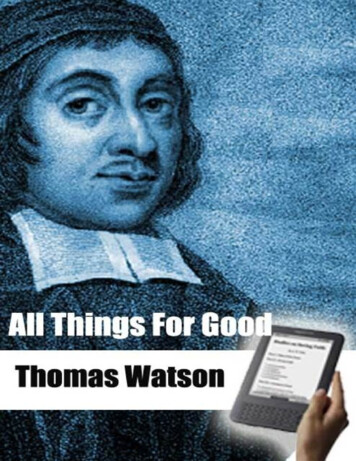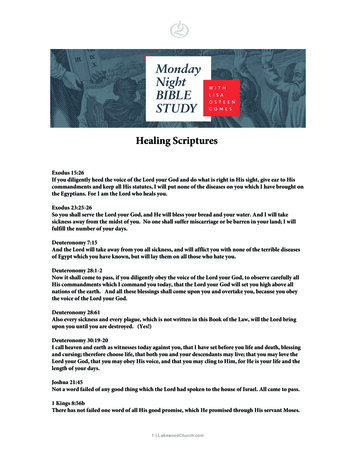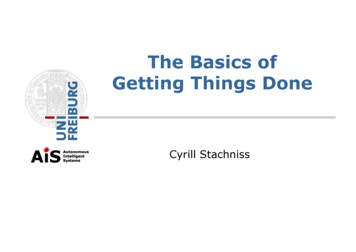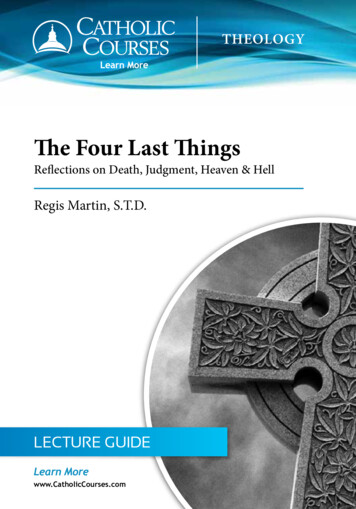
Transcription
THEOLOGYThe Four Last ThingsReflections on Death, Judgment, Heaven & HellRegis Martin, S.T.D.LECTURE GUIDELearn Morewww.CatholicCourses.com
TABLE OF CONTENTSLecture SummariesLECTURE 1Introducing the Study of the Last Things.4LECTURE 2The Christian Conception of Time and Its Relation to the Last Things. 8Feature: The Sacrament of the Present Moment. 12LECTURE 3Exploring the Nature and Dynamism of Hope. 14LECTURE 4On First Opening the Door of Death.18Feature: The Last Rites. 22LECTURE 5On Seeing Death as a Christian and the Consolation It Brings. 24LECTURE 6The Jig Is Up: On Judgment and the World to Come.28Feature: Purgatory. 32LECTURE 7On Going to Hell.34LECTURE 8On the Reality and Nature of Heaven. 38Suggested Reading from Regis Martin, S.T.D.422The Four Last Things / Regis Martin, S.T.D.
THEOLOGYRegis Martin, S.T.D.The Four Last ThingsReflections on Death, Judgment, Heaven & HellRegis Martin, S.T.D.Franciscan University of Steubenville, OHBIOGRAPHICAL INFORMATIONDr. Regis Martin is a longtime Professor ofSystematic Theology at the Franciscan Universityof Steubenville, Ohio, where he teaches courses onGod and Grace, Christ and the Church, and Maryand the Sacraments. Professor Martin holds botha Licentiate and a Doctorate in Sacred Theologyfrom the Angelicum—the Pontifical University ofSt. Thomas Aquinas in Rome, Italy.He is the author of several books, including- The Four Last Things (TAN Books, forthcoming)- The Suffering of Love: Christ’s Descent into theHell of Human Hopelessness(Ignatius Press, 2007)- What is the Church? Confessions of a CradleCatholic (Emmaus Road, 2003)- Flannery O’Connor: Unmasking the Devil(Sapientia Press, 2005)Professor Martin has lectured across thecountry and his articles have been published bythe National Review, Commonweal, Crisis, LayWitness, and Magnificat Prayer Book. ProfessorMartin is currently featured on EWTN with Fr.Michael Scanlon and Dr. Scott Hahn in a popular,long-running series titled Franciscan UniversityPresents.Learn More3
The Four Last ThingsRegis Martin, S.T.D.Lecture 1Introducing the Study of the Last ThingsThe Our Father is the voiceand content of Christianhope.4Our likeness to God is not the result of ourown doing, but of God’s generosity. Thus, ourfirst obligation is gratitude for a gift we can nevergive ourselves. We have a universal call to prayerwhich should always begin with thanksgiving.When we do not pray, we deny our creaturelystatus and the recognition that from moment tomoment, we exist entirely on sufferance. If Godwere to stop speaking our names, we would bevaporized at once.We must rely on prayer in order to find thestrength and courage necessary to face our end.The Our Father is the Lord’s Prayer—the mostpowerful and efficacious prayer of the Church.It is the only prayer enjoined upon us by ourBlessed Savior and thus the most perfect form ofpetitionary prayer. Additionally, the Our Fatheris the only prayer in which all the things forwhich we hope are given profound and lastingexpression.Hope is the key virtue for understanding theChurch’s doctrine of the end. The Our Fatherdeclares our hope that God will reach downinto this fallen world in order to save us. WithHope, we can rest assured in all the promises ofour Catholic faith, which include Heaven andthe Face of God smiling upon us forever. WithHope, we can also face what imperils thosepromises and what might lead to the everlastingtorments of Hell.The Four Last Things / Regis Martin, S.T.D.
In our modern age, a perversesilence hovers on the air the momentthe subject of death is brought up.Yes, certainly, Christ tells us: “I amthe resurrection and the life” and “hewho believes in me, though he die,yet shall he live” (John 11:25-26).However, is anyone really interestedin dying in order to discover what liesbeyond the veil of human mortality,even if that should be Heaven?As it happens, we have no otherpoint of entry into eternity apart fromdeath. And yet, when we consider theprice to be paid, everlasting life seemsto hold no appeal. For most people,looking to the end is exactly what theywish to avoid. Ironically, when we dofinally turn our heads to face the end,it will most likely be the end. Jesusurged his disciples to watch and pray,to be mindful of the end: “Thereforeyou also must be ready for the Son ofMan is coming at an hour you do notexpect” (Matthew 24:44).We are so easily “distracted fromdistraction by distraction,” to recallEliot’s image of modern man infearful flight from death. It seemsthat our inborn hunger for Godand an eternity spent in his company has become a sort of vestigialorgan which is no longer exercised.Learn MoreThe Lord’s PrayerOur Father, Who art in Heaven,hallowed be Thy Name.Thy Kingdom come.Thy Will be done, on earth as it is in Heaven.Give us this day our daily bread,and forgive us our trespasses,as we forgive those who trespass against us.And lead us not into temptation,but deliver us from evil. Amen.5
Is it possible that the wings of thehuman spirit have grown atrophiedfor want of use?To speak nowadays of man’s pilgrim state, of his promised homeland in Heaven, of the tribulationsof the world, and of the hope wehave for life beyond the grave,invites a blank stare of stupefactionfrom the many for whom eternityhas lost all attraction. But the pricepaid for such silence about deathis a heavy one. No one is exemptfrom the final nightfall throughwhich we shall all one day pass.Why not then follow theexample of Socrates, who famouslysaid that “the unexamined lifeis not worth living?” Practiceimitating those whose life isnothing more than an extendedmeditation on death; who carrytheir deaths before them; who livealways on the edge of eternity.It makes all the difference in theworld, as Pascal would say, “if it iscertain that we shall not be herefor long, and uncertain whether weshall be here even one hour.”After death begin the thingsthat will go on forever and ever.“To those who live by faith,” writesBlessed John Henry Cardinal Newman, “everything they see speaks ofthat future world. All that we seeis destined one day to burst forthinto a heavenly bloom. Heaven atpresent is out of sight, but in duetime, as snow melts and discovers what it lay upon, so will thisvisible creation fade away beforethose greater splendors which arebehind it, and on which at present it depends” (Plain & ParochialSermons Vol. 4, sermon 14).And so, as Christians, we dohave hope which sustains us in theface of death. Our hope is to sharein the glory of Heaven with OurBlessed Lady, whose fiat—her “yes”to God—opened the door of theworld to Christ, our salvation. Wecan turn to her, asking through herintercession for the gift of Hope, inorder that we might both understand the Last Things and be giventhe courage to face them.6The Four Last Things / Regis Martin, S.T.D.
Introducing the Study of the Last ThingsDiscussion Questions1.When we are faced with the Four Last Things, what should be our attitude toward prayer? How does the Our Father relate to Hope—the virtuemost necessary in facing the End?2.How does it help us to understand life if we see it, not as a problem to besolved, but as a mystery to be endured?3.Why is modern man so fearful of the presence of death? Why does oursociety have such a widespread resistance to eschatological inquiry?Notes:Learn More7
The Four Last ThingsRegis Martin, S.T.D.Lecture 2The Christian Conception of Time andIts Relation to the Last ThingsTime is the theater for ourjourney home to God.8We can think of life as a journey that eventuates in death. At birth, we all enter upon the roadalong which we must travel in the course of livingour lives. The road ends with death, which is followed by judgment and the prospect of an eternityof either Heaven or Hell. Three classifications canbe made about this metaphor of life as a journey.First, life begins, and then it ends. Meanwhile,sandwiched in-between, there is time in each passing moment, replete with all the promise and thepossibility of human freedom.The Church in her wisdom and experiencestudies time in three distinct disciplines, each ofwhich aims to throw light upon these great andseminal moments of time. Archeology studies thefirst things. The other end of the stick, Eschatology,studies the end—the Last Things. Finally, Kairologyis the study of this present moment, which St. Paulcalls kairos. It is not the same as chronos, which ismechanical, segmented time by which we mark offhours and days and weeks. Kairos is God’s time andis therefore free and gracious.Indeed, kairos is a gift given to us by Godso that we can experience this present, passingmoment as a means of grace, a sacrament even.The present moment is intended to lead us to theunending glory of the Kingdom, God, Heaven, theBeatific Vision. The poet T.S. Eliot, in his poemBurnt Norton, describes the present moment asan intersection with eternity—“the still point ofThe Four Last Things / Regis Martin, S.T.D.
the turning world.” In that still point,that timeless moment, the blessed soulundergoes a transforming union likethat rendered by Bernini in his depiction of St. Teresa of Avila’s Transverberation.For most of us, this extraordinaryand lofty moment in the life of the saintis so other-worldly that it does notapply to the ordinary human condition.Nevertheless, there is a sense in whichthe “still point” is meant to suffuse andpenetrate our lives as well. We havebeen given the present moment by Godto sanctify and to offer back to him.We are responsible for the moments oftime that are not make-believe, but infact real. We can’t do anything about thepast: it’s gone. Nor can we do anythingabout the future, because it doesn’t yetexist. The present moment is the onlyexperience of time we can have and sowe should seize it, take creative possession of it and turn it all to glory.Now the failure of those who seekto bypass the present, refusing God’sinvitation to bloom where they areplanted, will typically take one of twoforms. We often take flight into thefuture, fixating on a time which willnever exist because it magically seemsto hold all the pleasure and satisfactionwe can’t get enough of in the present.Learn MoreAn Intersection with EternityIn the New Testament, sometimes theword used for time is the Greek kairos. Theother Greek word for time, chronos, meanssimply the time measured during the passingof a day. Kairos means “the appointed time inthe purpose of God.” For example, John theBaptist’s proclamation in Mark 1:15—“Thetime is accomplished, and the kingdom of Godis at hand”—uses kairos because it refers tothe coming of Christ in the fullness of time.During the Divine Liturgy of the ByzantineCatholic Church, the ritual exclamation of thedeacon is “Kairos tou poiesai to Kyrio”—“It istime for the Lord to act.” The Liturgy, in thissense, is a moment pregnant with eternity—a“still point” in our turning world during whichwe intimately encounter the physical presenceof Christ.9
On the other hand is the temptationto take refuge in the past, which isan unreal place and time because itnever existed as we imagine it did,festooned with all sorts of romanceand sentimentality. Those who fallprey to either fixation miss theiropportunity to exploit this currentmoment, the moment of grace whichGod is giving us right now.In a wonderful book calledChrist and Apollo, American JesuitFr. William Lynch points out that thestructure of belief in the Apostles’Creed opens with a God who iswithout beginning, and then closeson a note of unending union andintimacy with this very same God,who is also without end. God’s verynature of being is both withoutbeginning or end. Inserted intothe gap between these two eternalbookends of God’s being is onlyone thing: time. Because God is theauthor of time, he is entirely andunambiguously “pro-time.” Indeed, allthe great events of salvation history—Incarnation, Cross, Resurrection—take place in time.As Bl. Pope John Paul II statesin a breath-catching assertion inhis Apostolic Letter preparing theworld for the coming of the ThirdMillennium, “In Jesus Christ, theWord made flesh, time becomes adimension of God, who is himselfeternal.” What is truly astonishingabout Christ’s life is the sheerauthenticity with which he lives theordinary, non-miraculous side of it.The Word of God does in fact reallybecome flesh and blood and bone.Fr. Lynch calls this Christ’s “resoluteliving and penetration into humantime.”Fr. Lynch concludes his bookwith this wonderful provocation:“It is not accurate to say that Christredeemed time. For time has neverneeded redeeming; it only neededsomeone to explore its innerresources fully, and add even furtherresources to it, as he did. And sopowerful and new is the exploration,in his case, that it is crowned notonly with insight but with theResurrection.”10The Four Last Things / Regis Martin, S.T.D.
The Christian Conception of Time and Its Relation to the Last ThingsDiscussion Questions1.How does kairos differ from chronos, and how might a proper understanding of time rescue us from the twin fixations with past and future?2.The title of Fr. William Lynch’s book, Christ and Apollo, suggests twocontrasting attitudes toward time. Apollo, god of the sun, symbolizesman’s longing to escape from the world. What attitude toward time doesChrist represent, and how does he change our perspective of time?3.What does it mean to say that “time has never needed redeeming?”What did Christ do, in time and to time, if he did not redeem it?Notes:Learn More11
The Sacrament of thePresent MomentFr. Jean-Pierre de Caussade’s Abandonment to Divine Providence isalso sometimes titled The Sacrament of the Present Moment. The followingexcerpt from this spiritual classic captures the importance of the intersection of the timeless in time–the kairos–of our everyday life. The “still point”of union with Divine Love can be grasped through the performance of ourdaily duties. We have no better example of how to live perfectly this sacramental present moment than in the life of the Blessed Virgin Mary.God continues to speak todayas He spoke in former times to ourfathers. Then, for those who led aspiritual life, each moment broughtsome duty to be faithfully accomplished. Their whole attention wasthus concentrated consecutively likea hand that marks the hours which,at each moment, traverses the spaceallotted to it. Their minds, incessantlyanimated by the impulsion of divinegrace, turned imperceptibly to eachnew duty that presented itself by thepermission of God at different hoursof the day. Such were the hiddensprings by which the conduct of Marywas actuated.“The power of the most Highshall over-shadow thee,” said the angelto Mary. This shadow, beneath whichis hidden the power of God for thepurpose of bringing forth Jesus Christin the soul, is the duty, the attraction,or the cross that is presented to us ateach moment. These are, in fact, butshadows like those in the order ofnature which, like a veil, cover sensible objects and hide them from us.Therefore in the moral andsupernatural order the duties of eachmoment conceal, under the semblance of dark shadows, the truth oftheir divine character which aloneshould rivet the attention. It was inthis light that Mary beheld them.12The Four Last Things / Regis Martin, S.T.D.
The Holy Spirit, who comes to take possession of her under theshadow of the angel’s words, will never abandon her.Also these shadows diffused overher faculties, far from creating illusion, did but increase her faith in Himwho is unchanging and unchangeable. The archangel may depart. Hehas delivered his message, and hismoment has passed. Mary advanceswithout ceasing, and is already farbeyond him. The Holy Spirit, whocomes to take possession of her underthe shadow of the angel’s words, willnever abandon her.There are remarkably fewextraordinary characteristics in theoutward events of the life of the mostholy Virgin, at least there are nonerecorded in Holy Scripture. Herexterior life is represented as veryordinary and simple. She did andsuffered the same things that anyonein a similar state of life might do orsuffer. She goes to visit her cousinElizabeth as her other relatives did.She took shelter in a stable in consequence of her poverty. She returnedto Nazareth from whence she hadbeen driven by the persecution ofHerod, and lived there with Jesusand Joseph, supporting themselvesby the work of their hands. It was inthis way that the holy family gainedtheir daily bread. But what a divineLearn Morenourishment Mary and Josephreceived from this daily bread forthe strengthening of their faith! It islike a sacrament to sanctify all theirmoments.What treasures of grace lieconcealed in these moments filled,apparently, by the most ordinaryevents. That which is visible mighthappen to anyone, but the invisible,discerned by faith, is no less than Godoperating very great things. O Breadof Angels! heavenly manna! pearl ofthe Gospel! Sacrament of the presentmoment! thou givest God under aslowly a form as the manger, the hay,or the straw.13
The Four Last ThingsRegis Martin, S.T.D.Lecture 3Exploring the Nature and Dynamism of HopeThe outcome of our hopedoes not depend on us, buton the grace of God.14To live well in the present moment, we mustgird ourselves with hope, which is the operativevirtue when facing the end. In paragraph 2090,the Catechism of the Catholic Church describeshope as “the confident expectation of divineblessing and the beatific vision of God.” If thepurpose of life is to get to Heaven and there tolook upon the face of God forever, then the exercise of hope will prove essential in the acquisition of that divine blessing. Only those who arefortified by hope will see God in Heaven.We find the same words in all the Creeds ofChristendom: “We look for the resurrection ofthe dead, and the life of the world to come.”St. Thérèse of Lisieux’s sanctity was characterized the sheer boundless audacity of her hope.“They are waiting to see,” she would exclaimspeaking of God and his saints, “how far I willgo in my trust, but not in vain was my heartpierced by that saying of Job’s: ‘Even if you killme, I will have hope in you.’” St. Thérèse alsomade the astonishing claim that “we can neverhave too much trust in our dear Lord. Onereceives as much from him as one hopes for.”The end of the New Testament contains thewhole content of the Church’s hope, distilled intothree simple words: “Come Lord Jesus.” Thesewords invite a real and lively expectation thatChrist will come. Because he has gone to preparea place for us in Paradise, he will surely comeThe Four Last Things / Regis Martin, S.T.D.
back to fetch us and take us homewith him. After all, Jesus made us twopromises which bear directly uponour hope and the hope of the Church:“I go and prepare a place for you.that where I am you too may be,”and, “I shall not leave you orphans.”(Douay-Rheims Bible, John 14:3, 18).The origin of man belongs atthe same time to the very goal andfinality of man. We come from God,we go to God, and all the momentsin between belong to God. GerardManley Hopkins, the 19th centurypoet whose imagination was steepedwith a Catholic sacramental vision,captures our hope in a lovely phrase:Thee, God, I come from, to thee go,All day long I like fountain flowFrom thy hand out, swayed aboutMote-like in thy mighty glow.”Whatever else the virtue of hope maybe, it represents, from first to last, thedeepest possible desire of the humanheart; it is the chief and abidingthirst we have.We are in the grip of hope. Itis a drive so fundamental that itdefines who we are. Here, in a worldcharacterized by scarcity and sin, theexistence of hope presupposes thisdeep persisting hunger and thirst ofthe human heart for happiness, bothLearn MoreFROM THEBALTIMORECATECHISMThe Theological VirtuesThose graces or gifts of God by which webelieve in him, and hope in him, and love him arecalled the theological virtues of Faith, Hope, andCharity. (Q. 462)Faith is the theological virtue by which wefirmly believe the truths which God has revealed.(Q. 465)Hope is the theological virtue by which wefirmly trust that God will give us eternal life andthe means to obtain it. (Q. 466)Charity is the theological virtue by which welove God above all things for his own sake, and ourneighbor as ourselves for love of God. (Q. 467)15
perfect and unchanging, whichwe simply do not have, but long topossess.The German Bishops in their1989 Catechism state “hope is verydifferent from optimism, whichimagines that things will somehowwork out. Hope reaches deeper andgoes farther. It is an expectationthat the bleak monotony and burden of everyday life, the inequality and injustice in the world, thereality of evil and suffering, willnot have the last word, are not theultimate reality.”Indeed, St. Thomas Aquinastells us that, “Before a thing can behoped for, it must first be desired.Things that are not desired are notobjects of hope; rather they arefeared or even despised.” To be sure,that which is hoped for might bedifficult to acquire. Aquinas teachesus that “hope necessarily impliesthe idea that the good hoped for ishard to get: trifles are the object ofcontempt rather than of hope.”Prayer is our language of hope.It is the recognition that whatwe ultimately desire, the sourceand finality of all our hope, doesnot finally depend on us but onGod. We must turn with armsoutstretched to God and ask forthat which we cannot obtain onour own. “The only genuine hope,”writes philosopher Gabriel Marcel,“is one directed toward somethingthat does not depend on us.” IfHeaven were an entitlement, thenit would not be grace, not be freedom, not be mercy.But, Heaven is not anythingmerited on one’s strength, charm,wit, good looks, or even virtue.In fact, the only merit we may layclaim to, to quote St. Bernard ofClairvaux, is God’s mercy, whichhe tends to dispense to those whodon’t deserve any. The very firstthing the Christian must learnabout himself is that he will neverbe good enough for Heaven andwill never be equal to God. Hopeis the virtue that enables us to persevere in the teeth of all that wouldprevent our going to Heaven; tocontinue to trust in God withwhom all things are possible,including even our own salvation.16The Four Last Things / Regis Martin, S.T.D.
Exploring the Nature and Dynamism of HopeDiscussion Questions1.In addition to the Creed and the Catechism definition, in which otherprayers or common expressions of the Church can we find expression ofChristian hope?2.Can you describe the distinction between desire and hope? How arethey the same, and how are they different? Does the object of desireaffect the difference?3.What does Joseph Ratzinger, now Pope Benedict XVI, mean by sayingthat “a Christian is someone who knows that he lives first and foremostas the beneficiary of a bounty ?” How does knowledge of our dependence on God affect the genuineness of our hope?Notes:Learn More17
The Four Last ThingsRegis Martin, S.T.D.Lecture 4On First Opening the Door of DeathMan is alone in knowinghe must die and that theprospect fills him withdread.18Leaving aside faith and hope for themoment, suppose we take note of our humanpredicament as if the promise of Revelation hadnever been made. Man is the only animal whocontemplates death, and who ponders the necessary and inevitable extinction of all things. Onlyman is aware of his own death, and is free tomeditate and reflect on its meaning. Man is theonly one who see his death as the final cancellation of all that he might have been or become.As St. Alphonsus Liguori put it three centuries ago, “What else is our life but a light vapor,which is driven away and disappears with thewind—a blade of grass which is dried up in theheat of the sun?” This is true of all contingentbeings, but only man knows it and remains trulyand deeply troubled by it.Death is the most commonplace and mostbanal of all events. Yet at the same time, deathis the most painfully incomprehensible and theleast welcome of all the things which conspire toovertake and destroy us. We are terrified by theface of death; it makes cowards of us all. Whenwe confront the sheer annihilating fact of deathitself, it induces a great and primal fear.Death, says philosopher Hans Urs vonBalthasar, “crushes and scatters to the four windsthe little bit of meaning that has been laboriouslyaccumulated in a life.” Strangely enough, facedwith such apparent meaninglessness, we humansThe Four Last Things / Regis Martin, S.T.D.
persist in hope, even apart from religion. A man’s gaze remains fixed onall that might lie beyond the horizonof death, even though all the evidenceof our senses reveals a very differentpicture.All that we are and all that wehave; nothing, it seems, is meant tosurvive. The cosmos, ourselves—everything—is a mere interludebetween two blank spaces of eternalnothingness. As another philosopher,Jean Paul Sartre said, “Nothingnesshaunts being.” Much of the culturethat surrounds us is characterized bythis sense of overpowering, pulverizing dread occasioned by man’sencounter with death and his fear ofnothingness which follows.All of us, some sooner than later,are scheduled to go through thedoor of death, taking our leave ofthis life. Right from the beginning,men have lamented their fate.Dylan Thomas’ poem, Do Not GoGentle, is a powerful testament tothe tenacity of the human spirit, itsdetermination to resist right to thevery end the awful finality of fate.Most of the human race does notwish to “go gently into that goodnight,” preferring as it were to “rageagainst the dying of the light.”Learn MoreContemplating DeathTwo ancient Latin mottos recall death’simminent presence: respice finem—“considerthe end,” and memento mori—“remember,you must die.” These slogans appearfrequently throughout Western literatureand art. Often, a skull, wilting flowers, or atimepiece will appear in paintings to serveas a reminder of life’s temporality. In theliturgy of Ash Wednesday, Catholics receive aphysical memento mori as a cross of ashes onthe forehead while the priest reminds them:“Remember man, you are dust, and to dustyou will return.”19
Man, alone among all thecreatures of the universe, knowsfour things: first, that he must die;second, that he remains averse todying; third, that he must bury hisdead; and finally, that it is fitting tomourn and remember those whohave died. In addition, man is theonly being who shows the leastindication of doubt concerning theapparent finality of death. What acurious paradox: on the one hand,only man knows he must die, yetthis same “quintessence of dust,”to quote Shakespeare, strangelypersists in believing death won’tlast, that it needn’t be forever.To take an example fromliterature, Muriel Spark wrote avery strange and prophetic novelin the 1950s called Memento Mori,which from the Latin roughlytranslates as “remember, you mustdie.” Her novel is an unsparing,utterly unsentimental account ofdeath, which is the first of the FourLast Things. If for the Victorianssex was the little secret aboutwhich men and women were noteven to whisper, then for us it isdeath: the great unmentionable ofthe modern world, which despiteevery effort of modern science andtechnology to eradicate, stubbornlypersists in killing us.In Spark’s novel, a seriesof characters receive ominoustelephone calls stating:“Remember, you must die.” Fewwho receive the calls are thankfulfor the salutary summons. Instead,they are thrown into suddenpanic and consternation. RetiredInspector Mortimer and GrannyTaylor are two characters whoare unalarmed by Death’s ringingreminder. As Mortimer notes, “Itis, you know, an excellent thing toremember, for it is nothing morethan the truth.”20The Four Last Things / Regis Martin, S.T.D.“To remember one’s death is, inshort, a way of life.”Granny Taylor says “a good deathdoesn’t reside in the dignity ofbearing, but in the disposition ofthe soul.”With such examples, we arereminded that we are Christians,wedded to all the promises ofChrist. We should remember thatdeath, which defines our mortalcondition, is a result of the sinfulestate into which we have all fallen.With this in mind, let us liberateourselves from the oppressions ofsecularity and recall the fact thatChrist, by his descent into all thatis human, has delivered us fromboth sin and death.
On First Opening the Door of DeathDiscussion Questions1.If death is so ordinary and unexciting an event, why do we live insuch mortal terror of it?2.Why does Dylan Thomas exhort us not to “go gently into that goodnight ?” What is the poet trying to tell us about death and ourresponse to it?3.How has our fear of death found expression in secular society?Notes:Learn More21
The Last RitesThe “Last Rites” are actuallya collection of three of the sacraments: Reconciliation, Viaticum,and Anointing of the Sick. In theCatholic Church, Reconciliation andHoly Eucharist can be received atany time in a person’s life. However,Anointing of the Sick is especiallyreserved to bring spiritual and physical strength to a person in danger ofdeath due to illness or old age.During the Last Rites, the firstsacrament received is Reconcil
Blessed Lady, whose fiat—her "yes" to God—opened the door of the world to Christ, our salvation. We can turn to her, asking through her intercession for the gift of Hope, in order that we might both under-stand the Last Things and be given the courage to face them. 6 The Four Last Things / Regis Martin, S.T.D.



